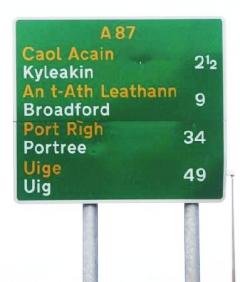Alba - Bilingual signs controversy

The debate following a decision by a Scottish Council to have Gaelic and English bilingual road signs is continuing this week, as some Councillors argue that the idea is ridiculous.
The Highland Council approved the bilingual road signs in March 2008, but since this time there have been numerous complaints from local Councillors who have actively campaigned against the decision, which has led commentators in Scotland to doubt the Scottish cultural committment of some of its elected representatives in certain areas. The arguments put forward by the councillors against the bilingual signs have been largely spurious and ill thought out at best and include the ususal 'bilingual road signs are a saftey hazard for motorists', 'its a waste of public money', 'there is no demand for them' and 'Gaelic was not spoken in these areas'.
In response, it has been pointed out that bilingual signs will only be erected as and when the old signs need replacing, that costs would not amount to more than a few hundred pounds a year and that the idea that there have never been Gaelic speakers in the area is a myth.
Consequently the Councillors who have expressed their opposition to the bilingual signs have been described as anti Gaelic and against Scottish culture. One area of local contention has been in the Caithness area, where The National Mod will be held in 2010. The Mod is an annual festival of Scottish Gaelic songs, art and culture and it has been argued that the decision to erect bilingual road signs has come about as a result of the planned event. The ongoing high profile campaign against the Highland Council decision has led some to argue in Alba/Scotland that it is undermining the efforts to provide a welcoming Scottish image in the run up to the Mod and the promotion of Scottish Gaelic in general.
Some of the local Councillors who have taken a lead in campaigning against the decision have been Bower Councillor Alan Roberts, Landward Councillor David Flear and Tannach and District Councillor Donald Henderson, Landward Councillor David Bremner, Berriedale and Dunbeath Councillor Neil Buchanan and Castletown and District Councillor Douglas Fraser.
If some of the Councillors visted Cymru/Wales they would see that the majority of road signs are bilingual and that even in Kernow/Cornwall, one of the poorest 'regions' in Europe, they would also see bilingual signs in some districts. In Scotland, Gaelic has official status and in the United Nations Year of International Languages 2008, local Government has been encouraged to take a proactive stance in the promotion and protection of its langues, especially endangered ones like Gaelic. An on line survey has been set up by 'The John O'Groats Journal' asking readers if Caithness should have bilingual road signs (see right hand side of webpage) and can be found at the link below.
The General Secretary of the League has written to the Convenor of the Highland Council Councillor Sandy Park expressing appreciation for their initiative. The full text of the letter can be found below:
Councillor Sandy Park Convener Highland Council
Dear Councillor Sandy Park
Bilingual road signs
I am writing to you on behalf of the Celtic League to express our thanks and appreciation to the Highland Council on its decision to develop a Gaelic/English bilingual policy for road signs throughout the area.
The promotion and protection of the Celtic languages is a main priority for the Celtic Lague and new uses of the Gaelic language within the public sphere in Scotland is particularly welcome and encouraging news. We are aware that the Council has had a number of detractors and criticisms from local councillors on its decision to develop a bilingual road sign policy, but I would like to show to you by writing that you also have strong international support for your decision.
During the year of the United Nations International Year of Languages 2008, your decision represents a means by which the Highland Council can demonstrate its sensitivity and concern for Scotland's linguistic heritage. As Mr. Koïchiro Matsuura, the Director General of the United Nations Educational Scientific and Cultural Organisation (UNESCO), said earlier this year:
«Languages are indeed essential to the identity of groups and individuals and to their peaceful coexistence. They constitute a strategic factor of progress towards sustainable development and a harmonious relationship between the global and the local context.... UNESCO therefore invites governments, United Nations organizations, civil society organizations, educational institutions, professional associations and all other stakeholders to increase their own activities to foster respect for, and the promotion and protection of all languages, particularly endangered languages, in all individual and collective contexts.»
Once again I offer you our congratulations on behalf of our members throughout the world and we look forward to seeing the bilingual road signs in place on our visit to The National Mod in 2010.
Yours sincerely
Rhisiart Tal-e-bot General Secretary"
There are a range of articles on this topic on CL News. Just type 'bilingual' into the search box on the home page.
J B Moffatt Director of Information Celtic League
30/05/08
■